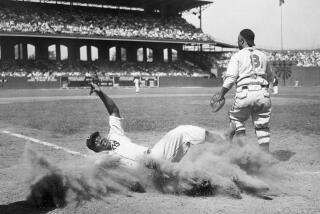The Big Picture: ‘Pelotero’ reveals messy business of Dominican ball
One of the most engaging stars in baseball today is the Boston Red Sox’s David Ortiz, a Big Gulp-sized Dominican Republic-born slugger who’ll show off his talents in Tuesday’s All-Star game in Kansas City. In 1992, when he was 16, Ortiz was given a $10,000 bonus to sign his first Major League Baseball contract with the Seattle Mariners.
That same year, a now-forgotten American college player named Jeffrey Hammonds was paid a $975,000 bonus to sign with the Baltimore Orioles. In that same draft of U.S. high school and college players, an unheralded high schooler named Derek Jeter signed with the New York Yankees for $800,000.
Even though the Dominican Republic has just 10 million people, only slightly more than L.A. County, the country is a fertile incubator of baseball talent: Nearly 20% of baseball players in the minors and major leagues hail from the Caribbean nation. I don’t mean to bore you with all those numbers, but they are at the heart of a fascinating new documentary called “Ballplayer: Pelotero,” which opens Friday in theaters and on video-on-demand. It eyeballs the vertiginous ups and downs of two top teenage Dominican prospects as they prepare for the red-letter day of July 2, the first day that Major League teams can sign foreign-born players in the international draft.
PHOTOS: 10 game-changing baseball movies
Directed by Ross Finkel, Trevor Marin and Jonathan Paley, “Pelotero” (Spanish for baseball player) began as an effort to explain how countless Dominican players who start out playing in the streets with sticks and rolled-up socks end up as Horatio Alger-style success stories. But after spending a year in the Dominican Republic, the filmmakers found a darker, far more disturbing story than they had expected.
“We were pretty naive at first,” conceded Finkel, 25, who flew to the Dominican Republic on the filmmaking team’s first scouting trip in 2008, just weeks after he’d graduated from the University of Colorado. “We wanted to capture the journey these players go through, but as you can see, things didn’t turn out to be so peachy keen.”
An unsettling portrait of a system rife with corruption and betrayal, “Pelotero” has a lot more in common with “Chinatown”than “Angels in the Outfield.” It is more investigative journalism than ESPN-style mythmaking. Like Jonathan Hock’s “The Best that Never Was” and Steve James’”Hoop Dreams” before it, the film offers a sobering respite from all the celebrity worship about our sports heroes that we get day in and day out on our TV screens.
For years, the Dominican has been the Wild West of baseball, where impoverished kids would shave years off their ages or even switch identities with younger players so they could pass themselves off as prodigies.
When the “Pelotero” filmmakers arrived in the country ahead of the 2009 signing season, signing bonuses were spiraling skyward, with one 16-year-old receiving a $4.25-million bonus in 2008. Early in the film, a baseball scout predicts on camera that MLB won’t stand by and let bonuses go any higher. He was right. Under the latest collective bargaining agreement, concluded last year, each MLB team’s entire expenditure in Latin America is limited to $2.9 million per year.
The filmmakers spent most of their time with Miguel Angel Sano, a top shortstop prospect avidly being courted by a number of teams. In the months before the July 2, 2009, signing deadline, a mysterious whispering campaign unfolded, alleging that Sano was older than he said he was. The rumors swirled: his mother had once had a miscarriage; maybe he wasn’t even her child. MLB launched an investigation, forcing Sano to undergo a battery of DNA tests and bone scans to prove his age and identity. The deadline came and went, but the investigation continued.
One day, when the filmmakers met with the MLB investigator, Rene Gayo (then a top scout with the Pittsburgh Pirates), Gayo told the Sano family that Miguel couldn’t be cleared without his help. Gayo waved the camera crew away, but later Sano informed the filmmakers that Gayo told him that if he admitted to being 19 and signed with the Pirates, the investigation would go away.
When Sano’s family appealed for help from local baseball authorities, the commissioner of Dominican baseball pointed the finger at Major League Baseball, insinuating that MLB was eager to find ways to undercut Sano’s value as a bonus baby. “There is only one MLB,” he told Sano’s family. “It’s a monopoly … I’m totally clear. This is happening because [your son] is poor.”
At their wits’ end, the family invited Gayo to their home, where they secretly videotaped their meeting using a camera borrowed from the filmmakers. Gayo wandered out of camera range and the video cuts out, but on the audio track we hear Gayo telling them: “You don’t have any problems because you’ve got me.”
The MLB probe fizzled, with investigators saying they didn’t have enough evidence to prove or disprove Sano’s age. Once thought to be worth $5 million, he ended up with a $3.15-million bonus from the Minnesota Twins, where he’s now a highly touted minor leaguer. But the way the investigation was handled makes you wonder whose hands are dirtier: The kids who lie about their age, as another prospect in the film does, or Major League Baseball, which appears to be more concerned about helping knock down signing prices than cleaning up a corrupt system.
“To us, there was plenty of information documenting Sano’s innocence,” said Finkel. “If the family could dig it up, why couldn’t the MLB investigators? It’s clear the system exists because it has produced incredible players who sign for very little money. So MLB wants to defend that system.”
I spoke with Boston Red Sox manager Bobby Valentine, who is one of the film’s producers, having provided finishing funds from a documentary film company he launched several years ago. He has spent considerable time in the Dominican, dating back to his days playing winter ball there in the 1970s. He insists that MLB has provided great opportunities for Dominican players. But he appears to be firmly in the “Forget it Jake, it’s Chinatown” camp.
“I don’t think the issue is with Major League Baseball,” he said. “They’ve made great strides in reforming the system. What’s questionable in one country isn’t in another. What you see is the way people have done business there for years.”
Drafting procedures have improved since the time in 1985 when record-keeping was so haphazard that two teams drafted the same prospect, prompting an MLB official to tell the rival teams: “Whoever gets to him first gets the player.” But judging from “Pelotero,” there’s room for much more improvement.
MLB reps wouldn’t talk to the filmmakers, or to me. They sent me a statement saying “the film has inaccuracies and misrepresentations,” adding that “MLB has undertaken a wide variety of measures and invested ample resources toward the improvement of the game’s operations in the Dominican Republic.”
Maybe so. Maybe it isn’t easy to make things squeaky clean in a country where baseball is one of the only paths to prosperity. But “Pelotero” raises so many uncomfortable questions about the messy economics of Dominican baseball that it is hard not to see MLB as part of the problem, not part of the solution.
Valentine calls Dominican ballplayers “a national treasure.” But as “Pelotero” makes clear, the search for that treasure isn’t a pretty picture at all.
Twitter: @patrickbigpix
More to Read
Only good movies
Get the Indie Focus newsletter, Mark Olsen's weekly guide to the world of cinema.
You may occasionally receive promotional content from the Los Angeles Times.










